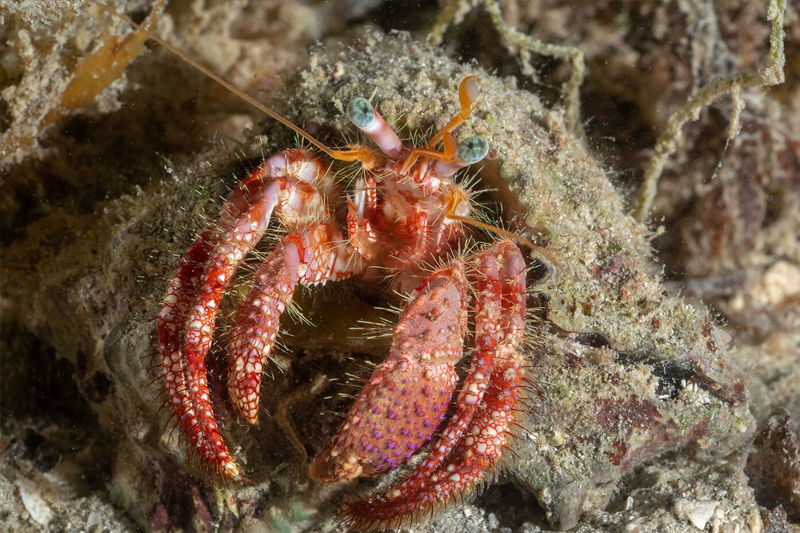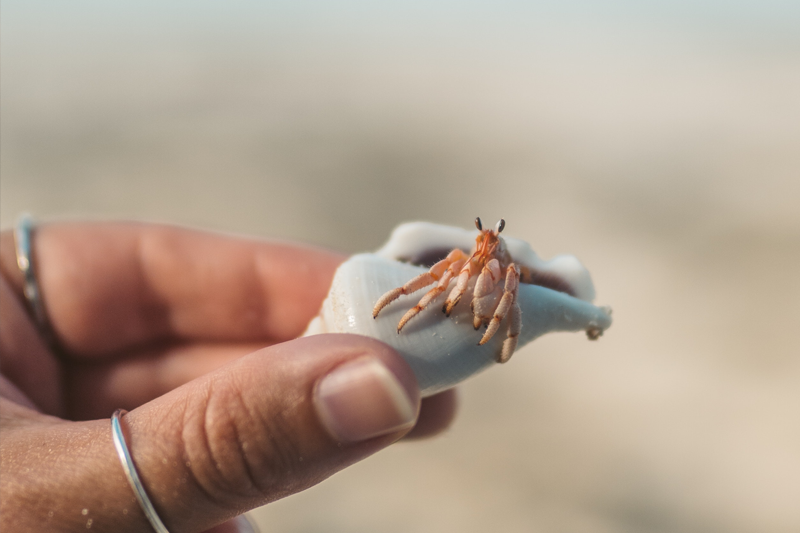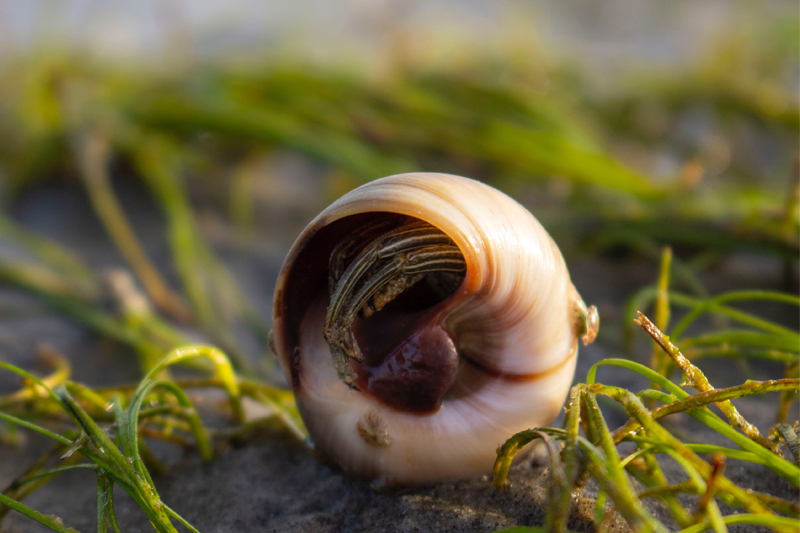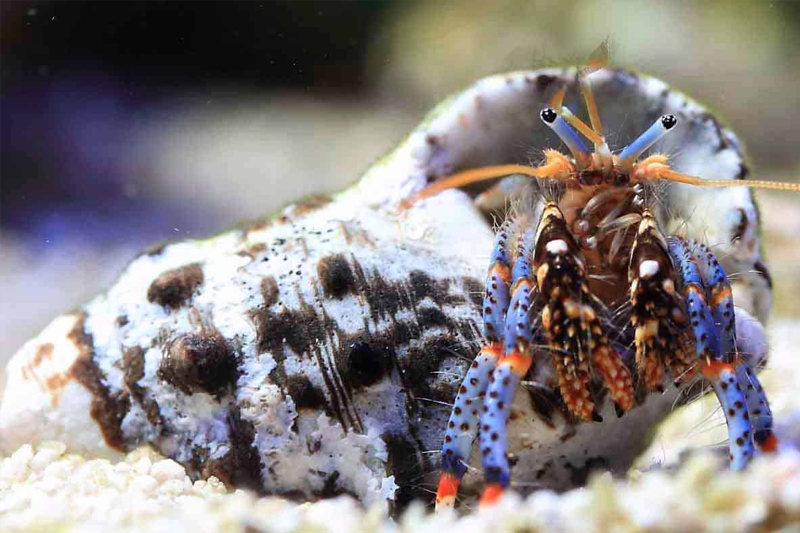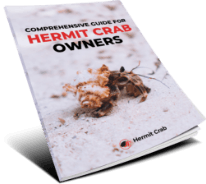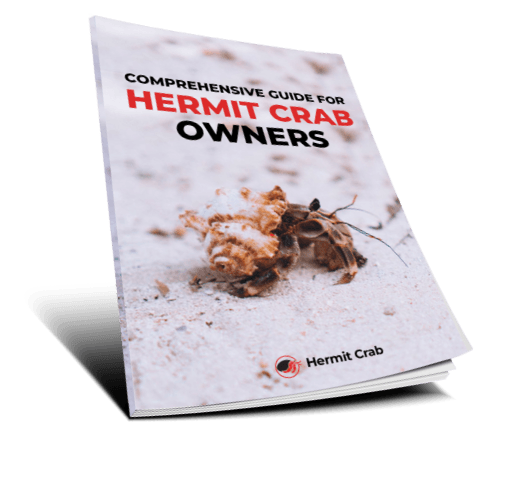Hermit crabs are omnivores, meaning they eat a variety of plant and animal matter. Their diet typically consists of both fresh and dried foods, and providing a balanced diet is essential for their health and well-being. Here’s an overview of what hermit crabs eat:
- Fresh Fruits and Vegetables: Hermit crabs enjoy a wide range of fruits and vegetables, including apples, bananas, carrots, spinach, kale, and bell peppers. These provide essential vitamins, minerals, and fiber.
- Protein Sources: Hermit crabs need protein for growth and energy. Suitable protein sources include cooked meats (chicken, turkey, beef), fish, shrimp, boiled eggs (without seasoning), and tofu. Commercial crab foods or fish flakes can also provide additional protein.
- Calcium: Calcium is crucial for hermit crab health, especially during molting when they need to harden their exoskeleton. Offer sources of calcium such as crushed eggshells, cuttlebone, or calcium-rich vegetables like broccoli.
- Grains and Seeds: Hermit crabs can consume small amounts of cooked grains like rice or oats, as well as seeds such as pumpkin or sunflower seeds. These foods provide carbohydrates and some essential nutrients.
- Commercial Hermit Crab Foods: There are commercially available hermit crab pellets or foods formulated specifically for their nutritional needs. These may include a mix of proteins, vitamins, and minerals.
- Special Treats: Occasional treats can be offered in small amounts, such as unsalted nuts, dried fruits (with no added sugars or preservatives), or seaweed.
- Water: Hermit crabs need access to fresh, dechlorinated water at all times. Provide a shallow dish of water for them to drink and soak in, and ensure it is changed regularly to prevent contamination.
What are the good sources of calcium?
Hermit crabs require calcium for proper exoskeleton development and overall health. Here are some good sources of calcium that you can provide for your hermit crabs:
- Cuttlebone: Cuttlebone is a common and readily available source of calcium for hermit crabs. It’s the internal shell of a cuttlefish and can be found in pet stores or online. Simply place a piece of cuttlebone in the enclosure for the crabs to nibble on.
- Crushed Eggshells: Crushed eggshells are an inexpensive and natural source of calcium. Make sure to thoroughly clean and crush the eggshells before offering them to your hermit crabs. You can sprinkle crushed eggshells directly into their food or scatter them around the enclosure.
- Calcium-Rich Vegetables: Certain vegetables are naturally high in calcium and can be included in your hermit crab’s diet. Examples include broccoli, kale, collard greens, and bok choy. Offer these vegetables raw or lightly cooked for the best nutritional value.
- Calcium Supplements: You can find calcium supplements specifically formulated for hermit crabs at pet stores. These supplements often come in powdered form and can be sprinkled over their food. Be sure to follow the manufacturer’s instructions for dosage.
- Natural Calcium Sources: Other natural sources of calcium include dried seaweed (such as nori), spirulina, and edible marine algae. These can be offered as occasional treats or incorporated into their regular diet.
- Commercial Hermit Crab Foods: Some commercially available hermit crab foods contain added calcium to ensure proper nutrition. Check the ingredients list to see if calcium carbonate or other calcium sources are included.
How about protein?
Protein is an essential component of a hermit crab’s diet, supporting growth, repair, and overall health. Here are some good sources of protein that you can offer to your hermit crabs:
- Cooked Meats: Lean, cooked meats such as chicken, turkey, beef, and pork are excellent sources of protein for hermit crabs. Ensure that the meat is unseasoned and cooked thoroughly to remove any bacteria or parasites. Cut the meat into small, bite-sized pieces before offering it to your hermit crabs.
- Fish and Seafood: Fish and seafood are rich in protein and other nutrients that are beneficial for hermit crabs. Offer cooked fish fillets, shrimp, crab meat, and other seafood options as occasional treats. Avoid feeding raw fish or seafood, as it may contain harmful bacteria.
- Boiled Eggs: Hard-boiled eggs are a nutritious protein source for hermit crabs. Remove the shell and mash the egg before offering it to your crabs. Eggs are also a good source of calcium, which further benefits their health.
- Mealworms and Crickets: Live or freeze-dried mealworms and crickets are popular protein-rich treats for hermit crabs. These can be offered occasionally as a supplement to their regular diet. Ensure that any live insects are gut-loaded with nutritious food before feeding them to your crabs.
- Commercial Hermit Crab Foods: Many commercially available hermit crab foods contain added protein sources such as fish meal, shrimp meal, or insect meal. These formulated diets provide a convenient and balanced option for meeting your hermit crab’s nutritional needs.
- Nutritional Supplements: You can also use nutritional supplements specifically designed for hermit crabs to ensure they receive adequate protein and other essential nutrients. These supplements typically come in powder or liquid form and can be sprinkled over their food.
How about safe to eat fruits & veggies then?
Yes, hermit crabs can safely eat a variety of fruits and vegetables as part of their diet. Fruits and vegetables provide essential vitamins, minerals, and fiber that contribute to their overall health and well-being. Here are some safe options of fruits and vegetables for hermit crabs:
- Fruits:
- Apples (remove seeds)
- Bananas
- Berries (strawberries, blueberries, raspberries)
- Grapes (seedless)
- Mangoes
- Melons (watermelon, cantaloupe, honeydew)
- Papaya
- Pineapple
- Pears
- Oranges (remove seeds and peel)
- Kiwi
- Figs (dried or fresh)
- Coconut (fresh or unsweetened dried)
- Vegetables:
- Carrots
- Broccoli
- Cauliflower
- Spinach
- Kale
- Bell peppers (red, green, yellow)
- Cucumbers
- Zucchini
- Squash (butternut, acorn)
- Sweet potatoes (cooked)
- Peas (cooked or thawed from frozen)
- Green beans (cooked or thawed from frozen)
- Lettuce (romaine, leafy greens)
When offering fruits and vegetables to your hermit crabs, it’s important to prepare them properly and provide them in appropriate portions. Here are some tips:
- Wash fruits and vegetables thoroughly to remove any pesticides or contaminants.
- Cut fruits and vegetables into small, bite-sized pieces to make them easier for hermit crabs to eat.
- Remove any seeds, pits, or cores from fruits before offering them to your hermit crabs, as these can be choking hazards.
- Rotate the types of fruits and vegetables you offer to provide a varied diet and ensure your hermit crabs receive a wide range of nutrients.
- Remove any uneaten fruits and vegetables from the enclosure after a few hours to prevent spoilage and maintain a clean environment.
By offering a balanced diet that includes a variety of safe fruits, vegetables, protein, and calcium, you can help ensure that your hermit crabs receive the nutrition they need to thrive in captivity.
